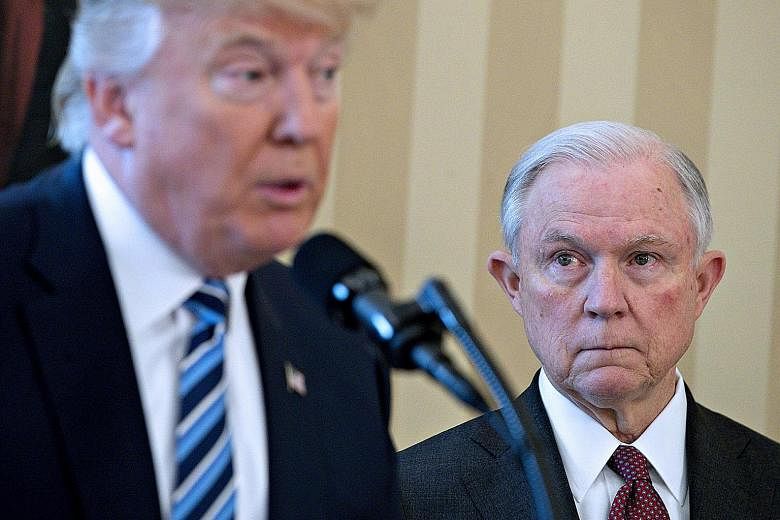WASHINGTON • President Donald Trump has attacked Attorney-General Jeff Sessions yet again, extending a campaign against Mr Sessions with what has become near-daily insults and criticism.
Mr Trump has made clear that his frustration with Mr Sessions, the former Alabama senator who was one of his earliest campaign supporters, stems from the Attorney-General's decision to recuse himself from the investigation into Russia's interference in last year's election and whether Mr Trump's associates conspired with Russia.
The pattern has fuelled suspicion that Mr Trump is trying to bully Mr Sessions into resigning - and might fire him if he does not leave voluntarily - in order to clear the way for a replacement who would take control of that investigation.
Here is a breakdown of possible legal and procedural paths such a manoeuvre could take.
Q Why is it harder to fire special counsel Robert Mueller with Mr Sessions in place?
A While most executive branch officials can be fired at will, the special counsel leading the Trump-Russia investigation, Mr Robert Mueller, is protected by Justice Department regulations. They say he can be "removed from office only by the personal action of the Attorney-General" and only for "good cause", such as misconduct. Because Mr Sessions is recused, his deputy, Mr Rod Rosenstein, is the acting Attorney-General for that inquiry. He appointed and oversees Mr Mueller.
While Mr Trump also nominated Mr Rosenstein, he is seen more as a Justice Department institutionalist than a Trump loyalist, and he has vowed to "defend the integrity" of the investigation, including by refusing to fire Mr Mueller without good cause. If Mr Trump were to order Mr Mueller fired and Mr Rosenstein refused - and then resigned, or was himself fired by Mr Trump - it could set up a repetition of the so-called Saturday Night Massacre of 1973, in which former president Richard Nixon's search for a Justice Department official willing to fire the special counsel investigating the Watergate scandal prompted a cascade of resignations. That would increase political risks for Mr Trump.
Q What could a new attorney-general do?
A A new attorney-general who is not recused from the Trump-Russia investigation would take over from Mr Rosenstein as the overseer of the special-counsel investigation and could fire Mr Mueller - either by declaring that Mr Mueller has overstepped in some way, or by first modifying Justice Department regulations to eliminate the rule protecting special counsel. A new attorney-general could also declare that the regular Justice Department can handle the investigation after all, disbanding Mr Mueller's staff. And, a new attorney-general could direct investigators to swiftly wrap up their work while narrowly interpreting their jurisdiction, such as limiting their ability to scrutinise the Trump Organisation's global financial dealings or whether Mr Trump's interactions with Mr James Comey, the former FBI director fired by the President, amounted to obstruction of justice.
Q How much latitude would Mr Trump have to pick a new attorney-general?
A If the Attorney-General's office becomes vacant and Mr Trump merely nominates someone else to fill it, Mr Rosenstein would serve as the acting Attorney-General for the time being until the Senate confirmed that pick, according to a statute. Mr Trump could also appoint a different acting Attorney-General under the Vacancies Reform Act, but it limits his options to senior Justice Department officials who have been in their positions at least three months, or other Senate-confirmed government officials.
If Mr Trump wants to unilaterally install anyone else as attorney-general without going through Senate confirmation, he might be able to do so under the Constitution's recess appointment clause. It empowers presidents to fill vacant positions during Senate recesses in excess of 10 days. A recess-appointed attorney-general would stay in power until January 2019, when the next Congress is seated.
Q Will the Senate's August recess present an opportunity?
A It could. If the Chamber goes into a formal recess before leaving Washington next month for its annual break, Mr Trump could make recess appointments while senators are on vacation. Congress could prevent presidents from making appointments during its breaks by holding so-called pro forma sessions, in which a senator comes into the otherwise-empty Chamber every few days and bangs the gavel. That technically breaks up a long recess into a series of short ones - each too brief to trigger appointment powers.
Q What would be the political fallout?
A Firing Mr Sessions and Mr Mueller would be a shocking moment for Washington, where many Republicans in Congress have expressed support for Mr Mueller and conservatives like Mr Sessions. But Republicans have also shown no appetite for impeachment proceedings to replace Mr Trump with Vice-President Mike Pence, and it is an open question what it would take to change that.
NYTIMES

